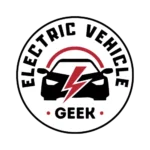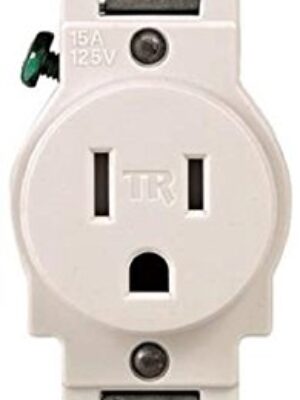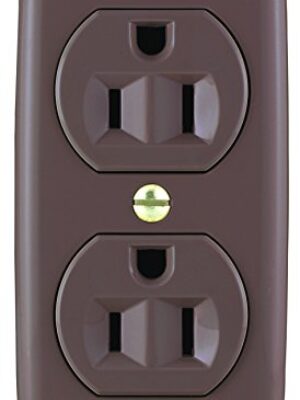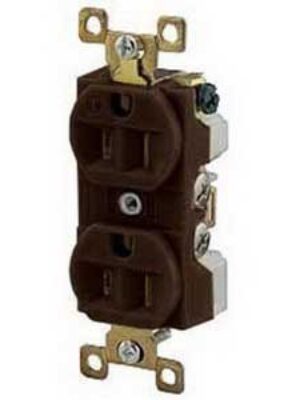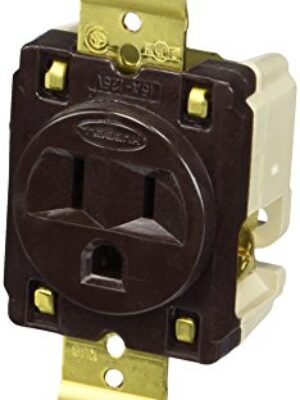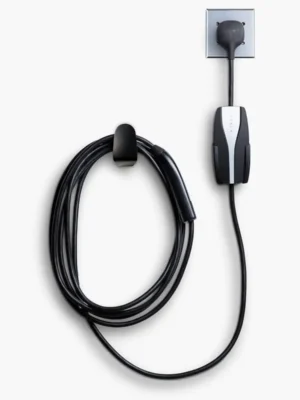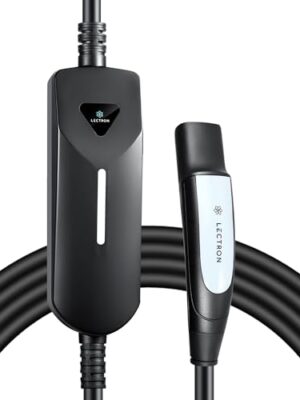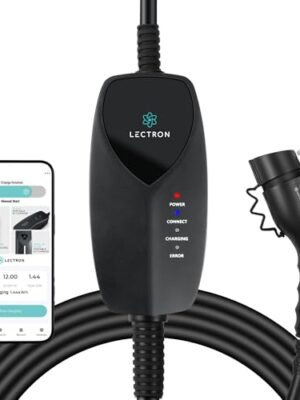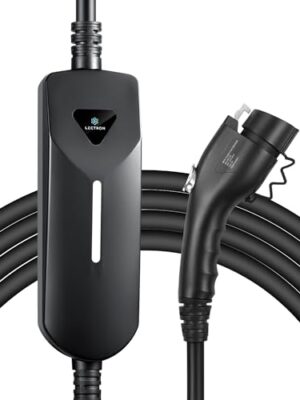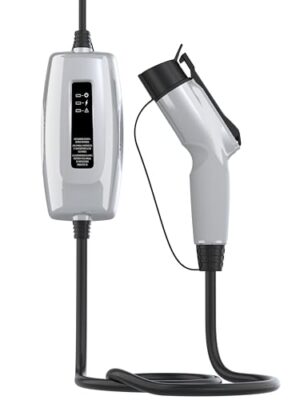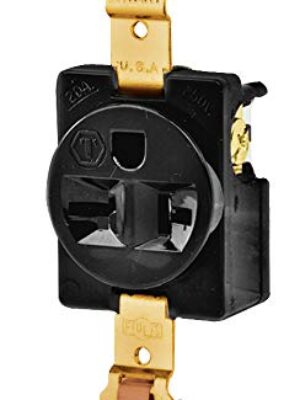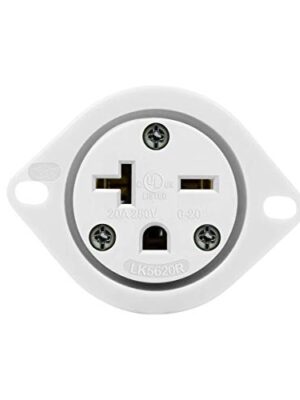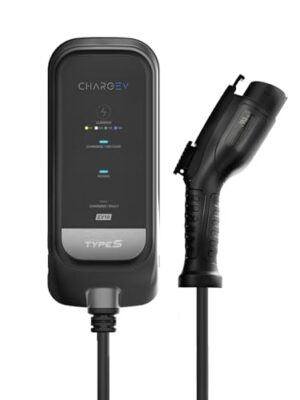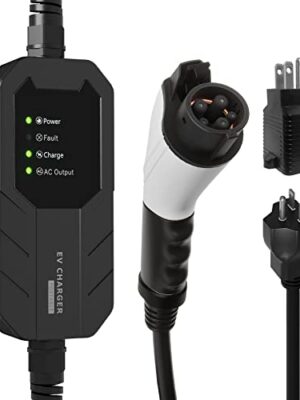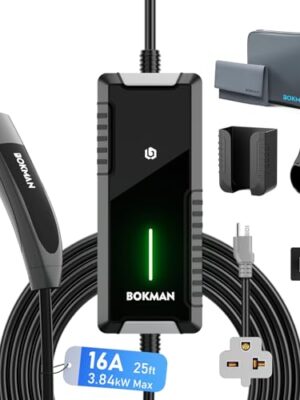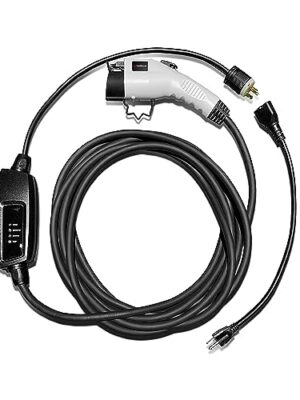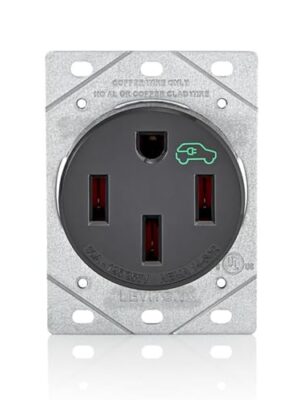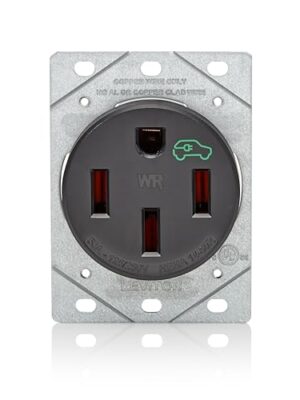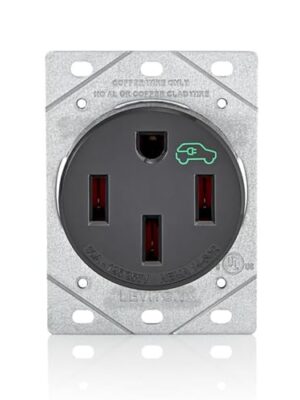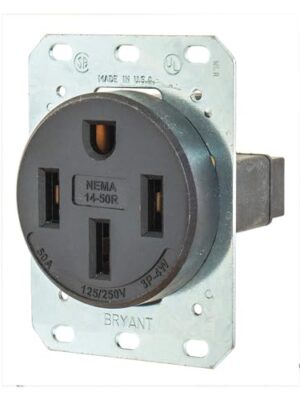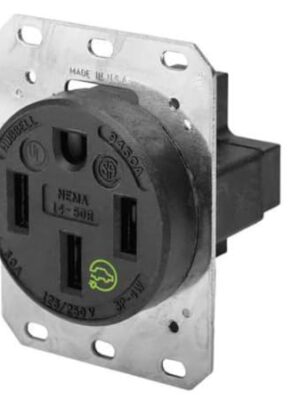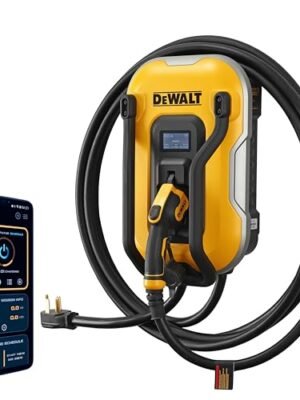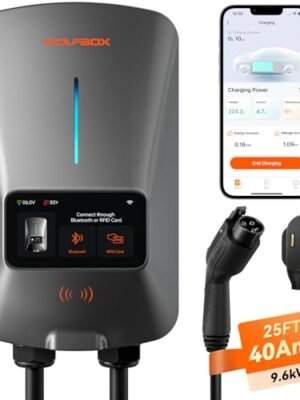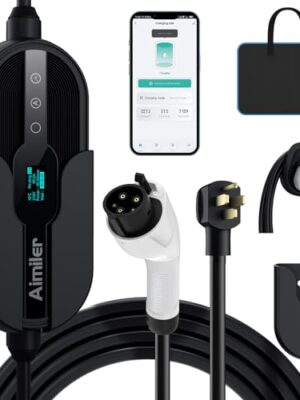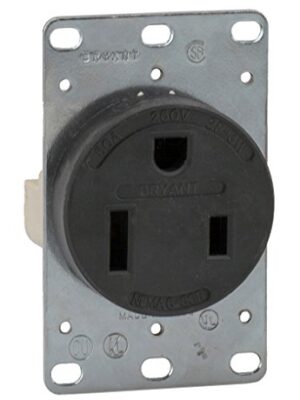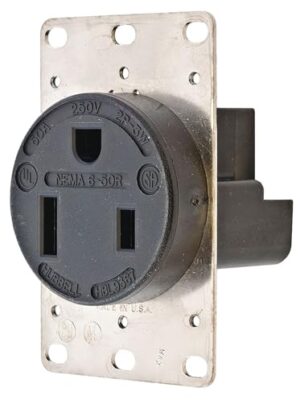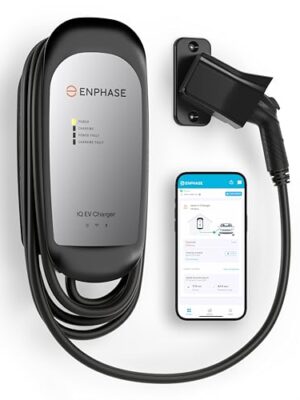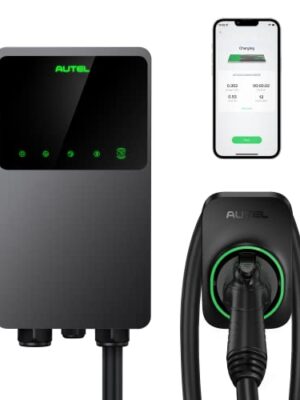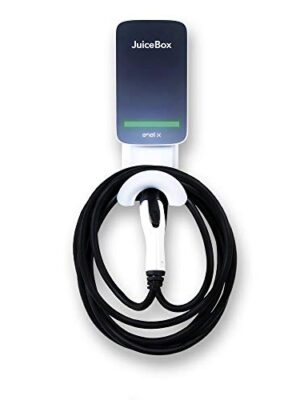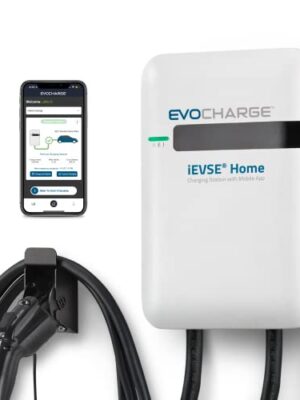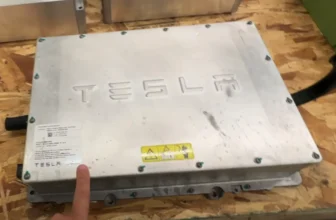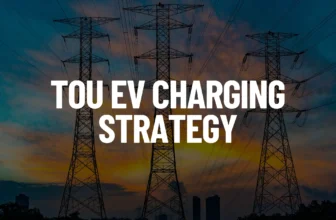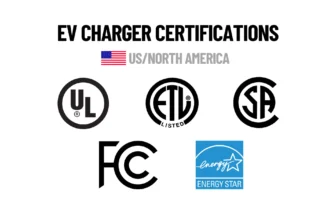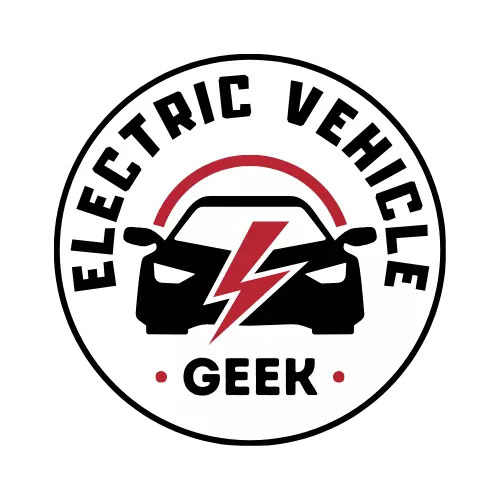Electric vehicle (EV) owners need to be familiar with the various types of EV charging outlets available for powering their vehicles using a plug-in EV charger. As EV adoption grows, understanding the different outlet types ensures you can make the right decision for home and travel charging.
The most commonly used outlets for portable EV chargers are NEMA outlets, each designed to support different EV charger plugs, voltages, and currents. This flexibility is essential for fast, efficient EV charging, whether you’re at home or on the road.
Table of Contents
- Types of Electric Car Charging Outlets
- Types of Electric Car Charging NEMA Outlets
- NEMA GFCI Outlets
- Choosing the Right Electric Car Charging Outlets
- Installation Considerations
- The Role of Public EV Charging Outlets
- Conclusion
Types of Electric Car Charging Outlets
This section provides an overview of the two main categories of electric car charging outlets: Level 1 and Level 2, highlighting the key physical differences in the outlet configurations.
Electric car charging outlets are categorized into two main types: Level 1 EV Charging Outlets (120V) and Level 2 EV Charging Outlets (240V).
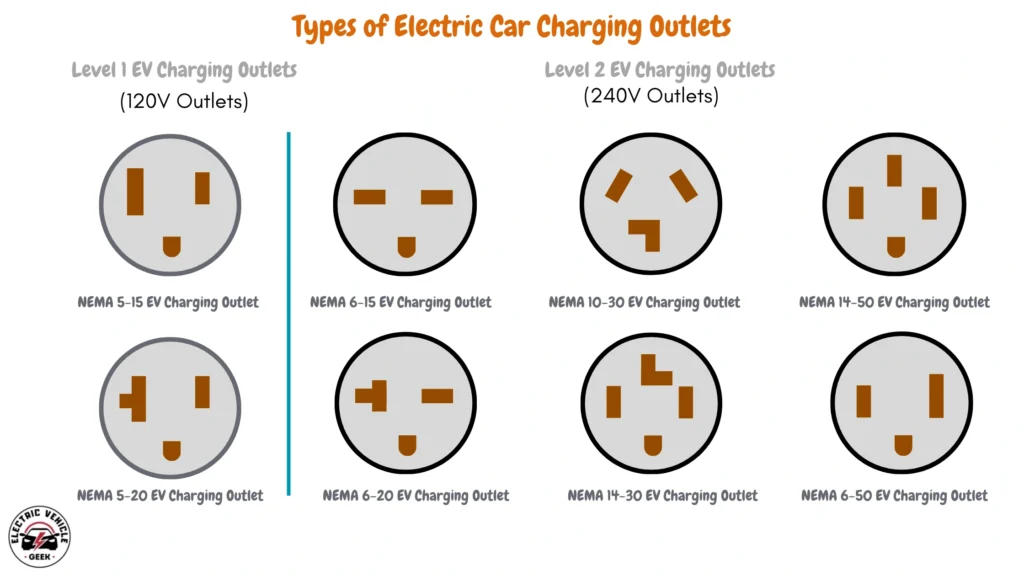
Level 1 EV Charging Outlets (120V)
- NEMA 5-15 EV Charging Outlet: A three-prong outlet with two vertical rectangular slots and a semi-circular grounding slot.
- NEMA 5-20 EV Charging Outlet: A three-prong outlet with one horizontal rectangular slot, one vertical rectangular slot, and a semi-circular grounding slot.
Level 2 EV Charging Outlets (240V)
- NEMA 6-15 EV Charging Outlet: A three-prong outlet with two horizontal rectangular slots and a semi-circular grounding slot.
- NEMA 6-20 EV Charging Outlet: A three-prong outlet with one horizontal rectangular slot, one vertical rectangular slot, and a semi-circular grounding slot.
- NEMA 10-30 EV Charging Outlet: A three-prong outlet with two angled rectangular slots and an L-shaped ground slot.
- NEMA 14-30 EV Charging Outlet: A four-prong outlet with two vertical rectangular slots, one L-shaped slot, and a semi-circular grounding slot.
- NEMA 14-50 EV Charging Outlet: A four-prong outlet with two vertical rectangular slots, one horizontal rectangular slot, and a semi-circular grounding slot.
- NEMA 6-50 EV Charging Outlet: A three-prong outlet with two vertical rectangular slots and a semi-circular grounding slot.
Types of Electric Car Charging NEMA Outlets
This section dives into the specific NEMA (National Electrical Manufacturers Association) outlet types used for electric vehicle charging. It provides detailed descriptions of the various NEMA outlets, such as NEMA 5-15, NEMA 6-20, and NEMA 14-50, along with their prong configurations and applications for Level 1 and Level 2 chargers.
NEMA 5-15 EV Charging Outlet
The NEMA 5-15 EV charging outlet is the most common household outlet.
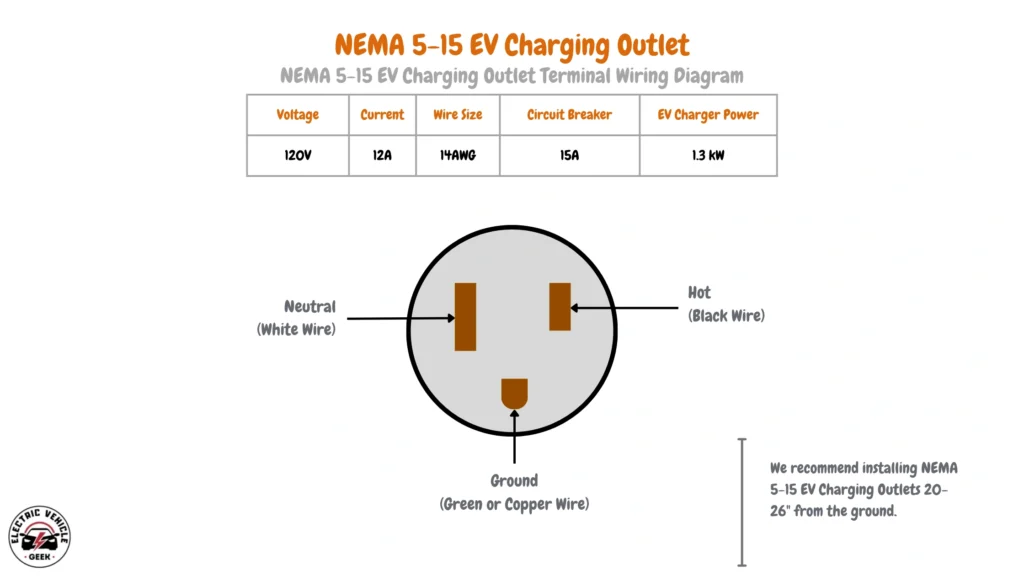
The NEMA 5-15 outlet supports 120V power at 15 amps, typically used for low-power devices like lamps, phone chargers, and small kitchen appliances. It has a three-prong configuration, including a hot (black) wire, neutral (white) wire, and a ground (green or copper) wire. For EV charging, a portable EV charger can be plugged into this outlet using a NEMA 5-15 adapter.
Using a Level 1 charger, the NEMA 5-15 outlet provides about 4 miles of range per hour. It is suitable for overnight charging but not ideal for daily driving needs due to slower charging speeds. Charging an EV like a Tesla Model 3 fully can take over 30 hours with this outlet.
Our detailed instructions cover every step of installing the NEMA 5-15 EV charging outlet, including clear circuit diagrams from the electrical panel to the outlet in our NEMA 5-15 EV charging outlet installation instructions.
Best NEMA 5-15 EV Charging Outlet
EV Chargers That Use a NEMA 5-15 Outlet
A handpicked selection of the best EV chargers compatible with NEMA 5-15 outlets, evaluated for features, performance, durability, and more.
NEMA 5-20 EV Charging Outlet
The NEMA 5-20 outlet is similar to the NEMA 5-15 outlet but supports up to 20 amps of current. It features a three-prong configuration, with a hot (black) wire, a neutral (white) wire, and a ground (green or copper) wire. This outlet can be used with an EV charger that has a power output of 1.7 kW, along with a NEMA 5-20 adapter.
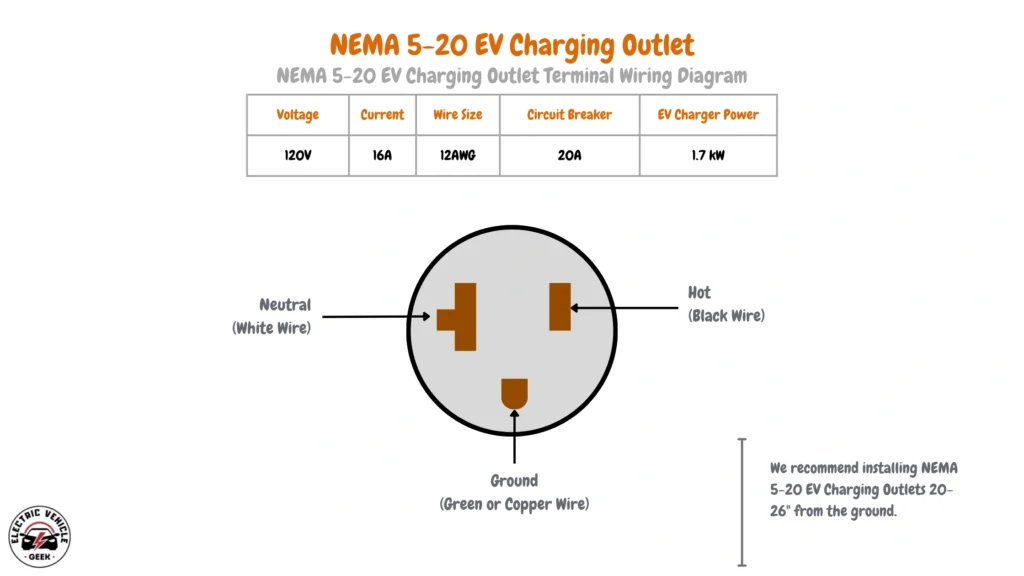
The NEMA 5-20 outlet provides a slight increase in power compared to the 5-15, making it suitable for low-power EV charging. It delivers approximately 5 miles of range per hour, ideal for overnight charging but not fast enough for daily driving needs.
We provide a comprehensive, step-by-step guide for installing the NEMA 5-20 EV charging outlet, complete with detailed circuit diagrams from the electrical panel in our NEMA 5-20 EV charging outlet installation instructions.
NEMA 6-15 EV Charging Outlet
The NEMA 6-15 outlet is a popular option for Level 2 EV charging. It has a three-prong configuration with two hot (black and red) wires and a ground (green or copper) wire. When used with a NEMA 6-15 adapter, it provides reliable and efficient charging at 2.8 kW.
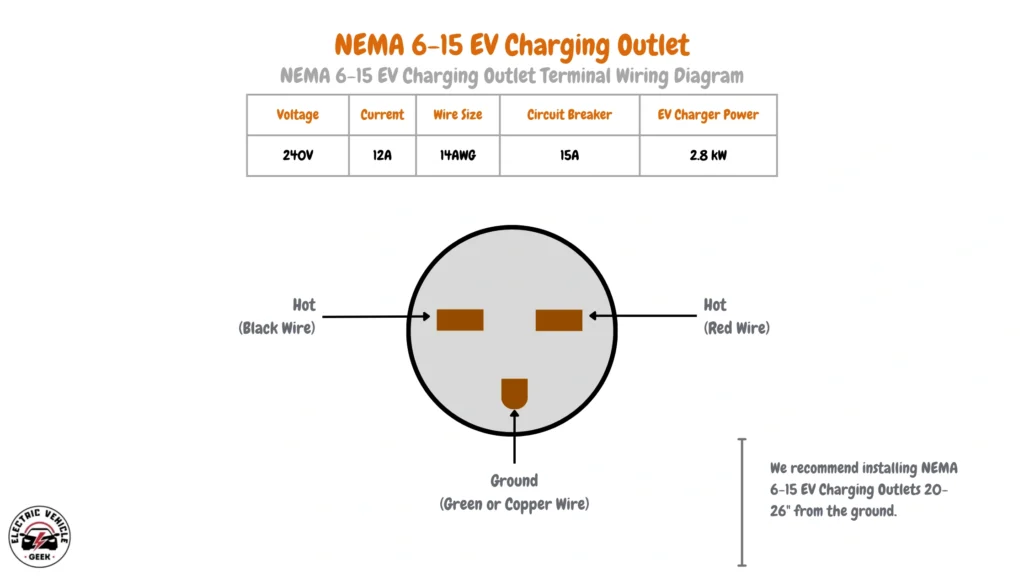
With a 240V, 15-amp rating, the NEMA 6-15 outlet offers faster charging than lower-powered 120V outlets like the NEMA 5-15. It can add approximately 12-16 miles of range per hour, depending on the charger and vehicle. However, it is still slower than higher-amperage outlets like the NEMA 6-20 or NEMA 14-50.
Installing a NEMA 6-15 outlet in your home significantly reduces charging times compared to Level 1 charging outlets (NEMA 5-15 and NEMA 5-20).
Check out our step-by-step instructions for installing the NEMA 6-15 EV charging outlet, including full circuit diagrams and guidance on the dedicated circuit breaker in our NEMA 6-15 EV charging outlet installation instructions.
NEMA 6-20 EV Charging Outlet
The NEMA 6-20 outlet provides a higher power capacity than the NEMA 6-15, supporting up to 20 amps. It features a three-prong configuration with two hot (black and red) wires and a ground (green or copper) wire. A NEMA 6-20 outlet is an excellent option for EV owners using a 3.8kW Level 2 charger with a NEMA 6-20 adapter.
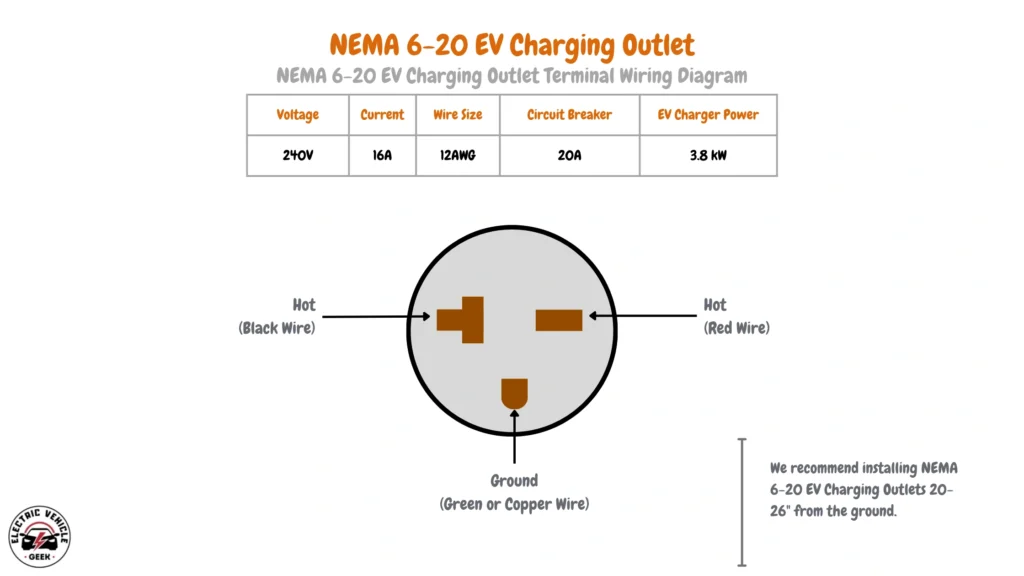
Operating on a 240V circuit, the NEMA 6-20 outlet offers faster charging compared to the NEMA 6-15, thanks to its higher amperage. This makes it a better choice for those seeking more efficient charging speeds.
Our easy-to-follow installation guide for the NEMA 6-20 EV charging outlet includes clear, step-by-step instructions and detailed circuit diagrams in our NEMA 6-20 EV charging outlet installation instructions.
Best NEMA 6-20 EV Charging Outlet
EV Chargers That Use a NEMA 6-20 Outlet
A carefully curated list of EV chargers designed to work with NEMA 6-20 outlets, evaluated for optimal charging speed, safety, and ease of use.
NEMA 10-30 EV Charging Outlet
The NEMA 10-30 outlet, commonly used for electric dryers, supports 240V at 30 amps. Although less common and outdated for EV charging, it can still be used with the right EV charger and a compatible NEMA 10-30 adapter.
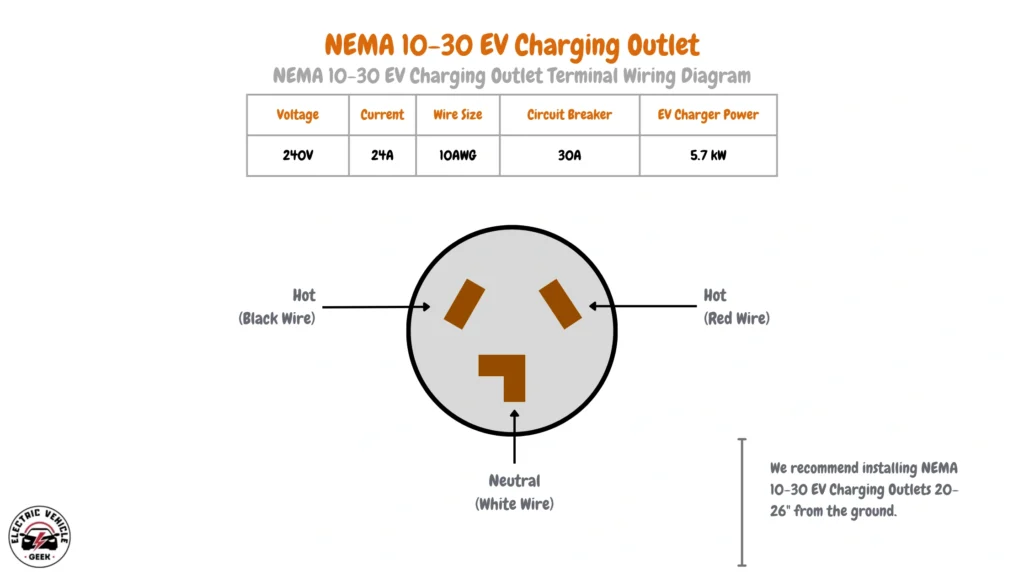
This setup provides 5.7kW of power, adding approximately 20 miles of range per hour of charging. While Tesla does not offer a 10-30 adapter, this outlet may be a practical option for homeowners with an existing NEMA 10-30 outlet and a compatible EV charger.
However, the NEMA 10-30 outlet is considered outdated for EV charging due to its lack of a dedicated ground wire. It has a three-prong configuration with two hot wires and a neutral wire, which was standard in older systems but does not meet current safety codes. The absence of a ground wire increases safety risks. A better option is the NEMA 14-30 outlet, which features a four-prong configuration with a dedicated ground wire. This outlet complies with modern electrical standards and provides enhanced safety for EV charging.
For a thorough guide on installing the NEMA 10-30 EV charging outlet, follow our step-by-step instructions, which include complete circuit diagrams in our NEMA 10-30 EV charging outlet installation instructions.
NEMA 14-30 EV Charging Outlet
The NEMA 14-30 outlet is one of the most common and ideal choices for 240V EV charging, making it highly recommended for upgrading your home EV charging system. It features a four-prong configuration: two hot wires (black and red), one neutral wire (white), and a ground wire (green or copper).
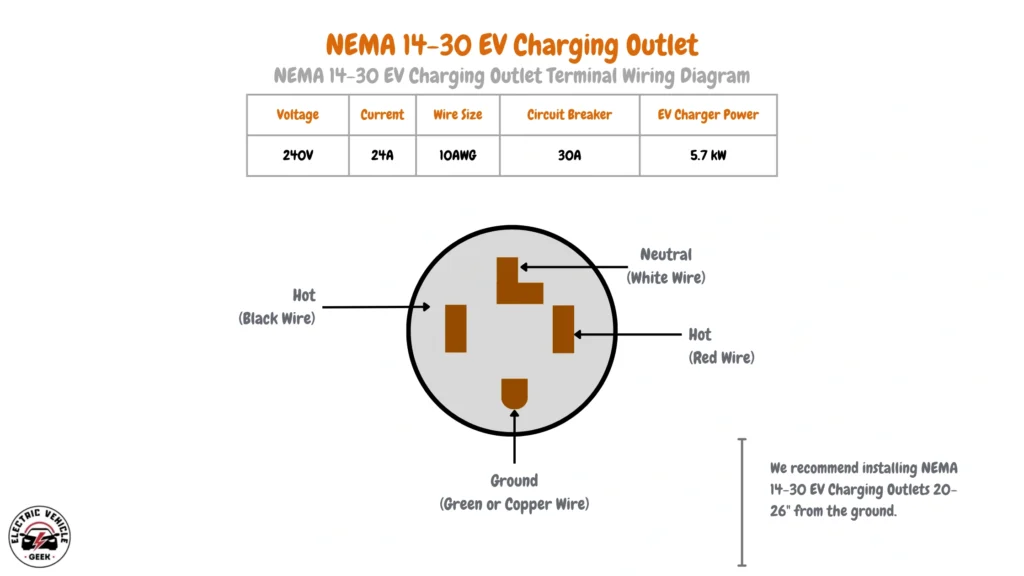
The NEMA 14-30 is used on a 240V, 30A circuit, providing efficient and reliable charging for electric vehicles. The NEMA 14-30 outlet is compatible with Level 2 EV chargers using a NEMA 14-30 adapter and delivers up to 7.2kW of power, making it suitable for most EVs and enabling faster charging compared to lower-powered outlets.
Our installation guide for the NEMA 14-30 EV charging outlet provides clear, step-by-step instructions along with full circuit diagrams for proper setup in our NEMA 14-30 EV charging outlet installation instructions.
NEMA 14-50 EV Charging Outlet
The NEMA 14-50 EV charging outlet is one of the most popular and powerful outlets for EV charging. It features a four-prong configuration: two hot wires (black and red), one neutral wire (white), and a ground wire (green or copper).
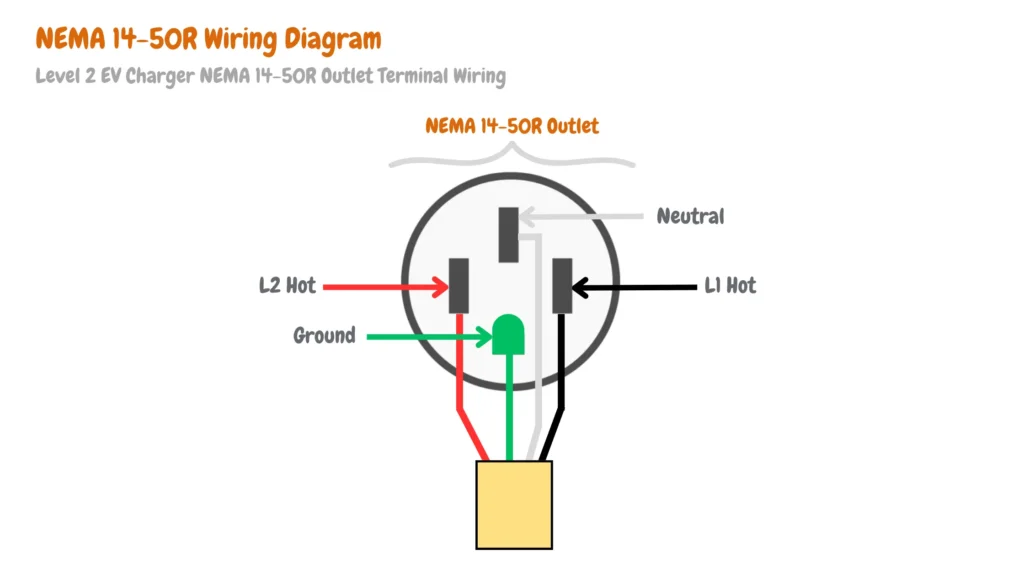
The NEMA 14-50 outlet is a 240-volt outlet that supports up to 50 amps, making it ideal for use with a plug-in EV charger equipped with a NEMA 14-50 adapter. It supports high-power Level 2 charging with an output of 7.6kW, enabling charging speeds of up to 30 miles of range per hour. This allows most EVs to be fully charged overnight.
Widely preferred by homeowners and businesses offering EV charging stations, the NEMA 14-50 outlet delivers faster charging speeds, making it a worthwhile investment. Installation requires a licensed electrician to ensure proper setup and safety.
The image below shows an electrical circuit diagram of a NEMA 14-50R outlet connected to a 120/240V single-phase electrical panel with a GFCI dedicated EV charging circuit breaker (NEC-US).

Our comprehensive NEMA 14-50 EV charging outlet installation instructions include clear, step-by-step instructions and detailed circuit diagrams to ensure proper setup. Additionally, we provide an in-depth guide for the NEMA 14-50R GFCI outlet for EV charging and a complete installation guide for the best NEMA 14-50 outlet for Tesla chargers. Be sure to explore these resources for more detailed information.
Best NEMA 14-50 EV Charging Outlet
EV Chargers That Use a NEMA 14-50 Outlet
Check out our selection of premium EV chargers compatible with NEMA 14-50 outlets, carefully tested for seamless compatibility with NEMA 14-50 outlets, functionality, and long-lasting performance under continuous loads of 40 amps.
NEMA 6-50 EV Charging Outlet
The NEMA 6-50 EV charging outlet is a high-powered, 240V outlet commonly used for Level 2 electric vehicle charging. It features a three-prong configuration: two hot wires (black and red) and a ground wire (green or copper).
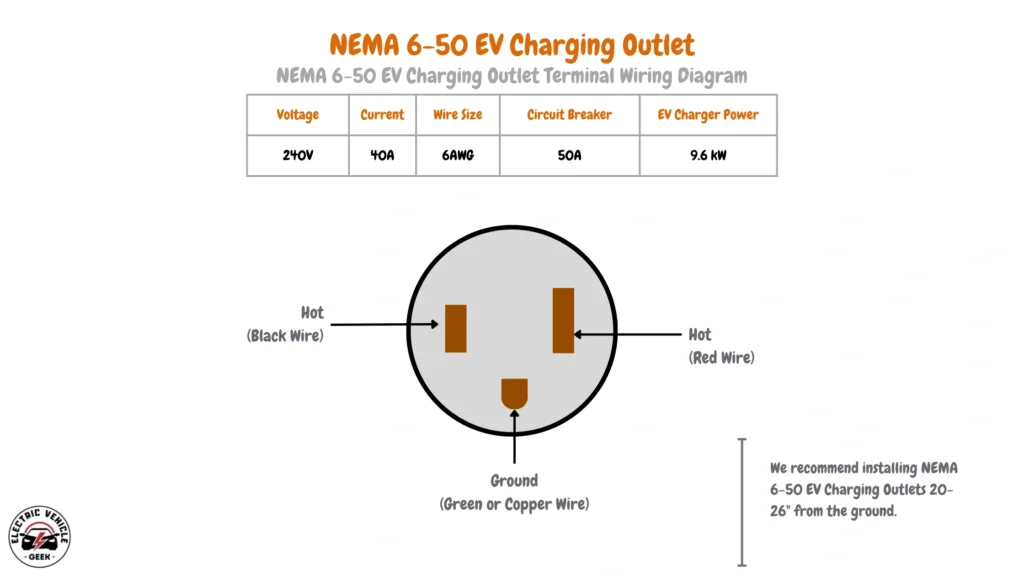
The NEMA 6-50 outlet supports up to 50 amps and provides 9.6kW of power for Level 2 EV charging when used with a Level 2 EV charger and a NEMA 6-50 adapter. This allows charging speeds of up to 30 miles of range per hour, making it ideal for homeowners and businesses who need fast, reliable charging. It can fully charge most EVs overnight and is a good option for those with multiple electric vehicles.
For the NEMA 6-50 EV charging outlet installation, we provide a detailed guide with clear instructions and circuit diagrams to ensure proper setup in our NEMA 6-50 EV charging outlet installation instructions.
Best NEMA 6-50 EV Charging Outlet
EV Chargers That Use a NEMA 6-50 Outlet
Explore the top-rated EV chargers that support NEMA 6-50 outlets, tested for quality, reliability, and exceptional performance under various conditions.
NEMA GFCI Outlets
A NEMA GFCI (Ground Fault Circuit Interrupter) outlet provides critical protection against electric shock, making it a key safety feature for electric vehicle (EV) charging stations and EV charger installations.
How a GFCI Outlet Works
A GFCI outlet constantly monitors the flow of electricity. If it detects a difference between the outgoing and returning current, it instantly cuts off power, preventing electric shocks.
Why GFCI Outlets Are Crucial for EV Charging
- Safety: GFCI outlets prevent electric shocks, particularly in damp areas.
- Code Compliance: The National Electrical Code (NEC) requires GFCI protection for EV charging stations to meet safety standards.
- Equipment Protection: GFCI outlets protect electrical components from damage caused by ground faults.
Identifying a GFCI Outlet
A GFCI outlet features:
- Test and Reset Buttons: To periodically check the outlet’s functionality.
- Indicator Light: This shows whether the GFCI is working correctly.
- Distinctive Shape: GFCI outlets differ from standard outlets in shape.
Incorporating a NEMA GFCI outlet in your EV charging setup helps minimize shock risks and protects your EV charger electric vehicle branch circuit components when a ground fault occurs. Check out our guide to testing EV charger earth leakage and faults.
Choosing the Right Electric Car Charging Outlets
The best electrical outlet for electric car chargers depends on your electric vehicle charger plug type, available space, and whether you need to upgrade your electrical system. Here’s a quick guide:
Level 1 Charger Outlet
If you’re looking for an easy plug-and-play solution, a NEMA 5-15 outlet can provide basic Level 1 EV charging. However, charging will be slow, and it’s best used as an emergency or overnight charging solution. This is the slowest type of charging, typically using a standard 120-volt outlet (NEMA 5-15). It’s suitable for overnight charging and can add about 4-5 miles of range per hour.
Level 2 Charging EV Charging Outlet
For faster, more efficient charging, a NEMA 14-50 outlet is ideal for fast Level 2 EV charging, especially if you drive an electric car regularly. It can provide faster charging times, allowing you to fully charge your vehicle overnight. This is the most common type of home charging and uses a 240-volt outlet (NEMA 14-50). It can add 25-30 miles of range per hour, making it ideal for daily charging.
Installation Considerations
When installing an electric car outlet installation, especially for a 240-volt outlet for an electric car, it’s crucial to hire a licensed electrician. Installing a 240v outlet for EV charging requires ensuring that your home’s electrical system can handle the additional load. This may involve upgrading your electrical panel or installing a new circuit.
For those with existing 240V outlets, such as a dryer outlet, a NeoCharge Smart Splitter can provide a cost-effective solution by allowing you to charge your EV while using the appliance simultaneously. This eliminates the need for a complete outlet installation while offering flexibility.
The Role of Public EV Charging Outlets
If you don’t have a compatible NEMA outlet electric vehicle branch circuit, EV charging outlets are available at various public and private locations. These public EV charging outlets typically use 240v car charger outlets to provide quick and efficient charging. Charging stations offer different types of electric car plug types, but most are compatible with standard EV connectors like the J1772 plug. If you’re traveling or in a location without a charging station, it’s important to know the types of EV chargers that your car supports.
Conclusion
Understanding the different car charger plug types and car charging receptacle options is key to ensuring that your EV charging experience is smooth and efficient. Whether you’re using a portable EV charger with a 120V outlet or installing a 240V outlet for electric car use, having the right setup can reduce charging times and increase the convenience of owning an EV. Make sure to choose the appropriate outlet for your needs, and consult with a professional when necessary to ensure safe and efficient installation.
By selecting the right electric car charging outlet, whether it’s a NEMA 14-50, NEMA 6-50, or another suitable outlet, you can enjoy fast and reliable charging at home or while traveling.

James Ndungu is a certified EV charger installer with over five years of experience in EVSE selection, permitting, and installation. He holds advanced credentials, including certification from the Electric Vehicle Infrastructure Training Program (EVITP) and specialized training in EV charging equipment and installation, as well as diplomas in EV Technology and Engineering Fundamentals of EVs. Since 2021, James has tested dozens of EV chargers and accessories, sharing expert insights into the latest EV charging technologies.
